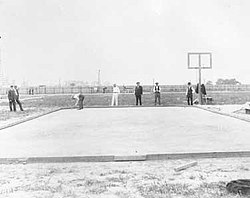Roque

The Olympic roque competition in 1904.
|
|
| Highest governing body |
American Roque League (1916-1970s?) |
|---|---|
| First played | 1880s |
| Characteristics | |
| Team members | 1-on-1 |
| Type | Outdoor, croquet |
| Equipment | Mallets, balls |
| Venue | Curbed clay court, with arches |
| Presence | |
| Olympic | Summer 1904 |
| Obsolete | Yes |
American Roque League (1916-1970s?)
National Two Ball Roque Association (?-1970s?)
National Roque Association (1899-?)
Roque /ˈroʊk/ is an American variant of croquet played on a hard, smooth surface. Popular in the first quarter of the 20th century and billed "the Game of the Century" by its enthusiasts, it was an Olympic sport in the 1904 Summer Games, replacing croquet from the previous games.
Roque is played on a hard sand or clay 30 by 60 foot (approximately 9 by 19 m) court bordered by a boundary wall, a curb bevelled at the ends to form an octagon. Players use this wall to bank balls similarly to how billiard balls are played off the cushions of a billiard table.
The wickets, called arches, are permanently anchored in the court. The arches are narrow as in professional six-wicket croquet. The court has ten arches in seven points configured in a double diamond (or figure-8). The two farthest end points and the central point of the figure-8 are double arches (one after the other) while the four side (or corner) points have single arches. Each arch of the double arches at either end of the court count as a separate arch, but the double arches in the center (which are closer together) are scored as a single arch. While in nine-wicket croquet the single central wicket opens up to the length of the court facing the stakes, in roque the double center arches face the sides of the court. Roque uses two stakes: at the head of the court is the "head stake," the other stake at the far end of the court is the "turning stake."
...
Wikipedia
